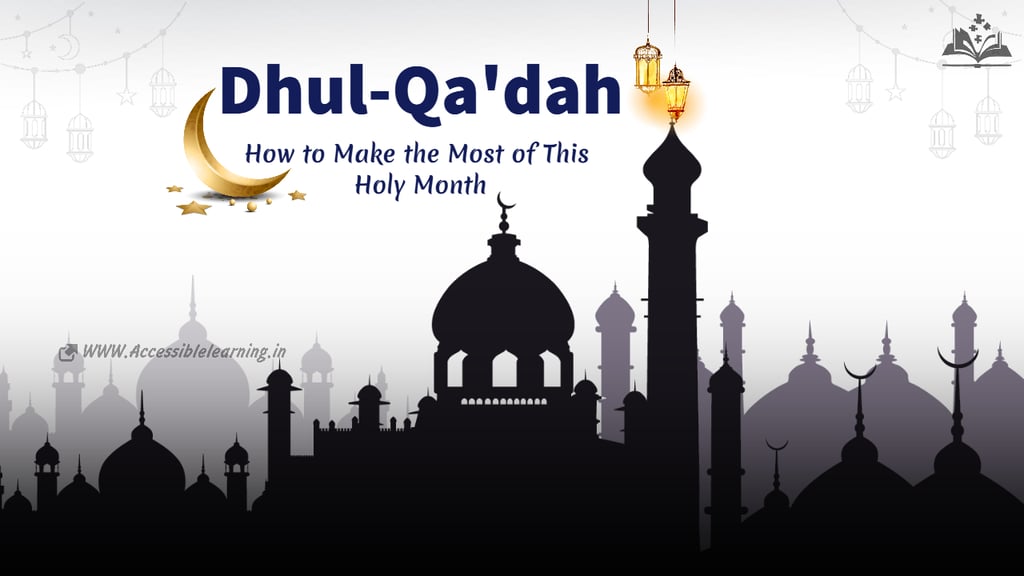
Beginning of Dhul-Qa'dah: A Sacred Month in the Islamic Calendar
Discover the significance of Dhul-Qa'dah, one of the four sacred months in Islam. Learn about its historical importance, spiritual benefits, recommended acts of worship, and its connection to Hajj. Embrace peace, reflection, and devotion during this blessed time.
CULTURE/TRADITIONEVENT/SPECIALCELEBRATION/FESTIVALS
Sachin K Chaurasiya
4/23/20254 min read


The Islamic calendar is rich with sacred months that hold profound religious and historical significance. One such month is Dhul-Qa'dah, the eleventh month of the Islamic (Hijri) calendar. As one of the four sacred months (Al-Ashhur Al-Hurum), Dhul-Qa'dah marks a period of peace, reflection, and spiritual preparation. Understanding its significance and the impact it holds in Islamic traditions helps Muslims align their actions with divine guidance.
Meaning and Significance of Dhul-Qa'dah
The name Dhul-Qa'dah originates from the Arabic root "Qa'ada," meaning "to sit or rest." Historically, this month was designated as a time when Arab tribes refrained from warfare, observing a truce to prepare for the sacred pilgrimage of Hajj, which follows in Dhul-Hijjah. The significance of Dhul-Qa'dah is mentioned in the Quran:
"Indeed, the number of months with Allah is twelve months in the register of Allah from the day He created the heavens and the earth; of these, four are sacred..." (Surah At-Tawbah 9:36)
The four sacred months include Muharram, Rajab, Dhul-Qa'dah, and Dhul-Hijjah, during which fighting was traditionally prohibited unless in self-defense. This sacred status encourages increased devotion, worship, and ethical conduct.
The Beginning of Dhul-Qa'dah: What to Expect
The beginning of Dhul-Qa'dah is determined by the sighting of the new moon, following Islamic lunar calendar traditions. The crescent moon (hilal) marks the start of the month, and Islamic scholars and astronomers work together to confirm its appearance.
As Dhul-Qa'dah begins, Muslims enter a time of spiritual preparation and peaceful reflection. The month serves as a bridge between the month of Shawwal (which follows Ramadan) and Dhul-Hijjah (the month of Hajj and Eid-ul-Adha). Many believers take this opportunity to
Reflect on their faith and renew their intentions.
Seek forgiveness and engage in supplications.
Prepare for Hajj, either physically, financially, or spiritually.
Engage in acts of kindness and charity, since the rewards for good deeds are multiplied in sacred months.
Increase family and community bonding, fostering love and unity among Muslims.
Avoid disputes, arguments, and negative speech, as the sacred months demand higher moral conduct.


Recommended Acts in Dhul-Qa'dah
Although Dhul-Qa'dah does not contain any obligatory fasts or specific rituals like Ramadan or Dhul-Hijjah, it remains a special time for devotion. Some recommended acts include:
Increased Worship and Repentance
Engage in extra prayers (Nafl Salah).
Seek forgiveness (Istighfar) and make sincere supplications (Dua).
Recite the Quran, reflect on its meanings, and act upon its teachings.
Perform Umrah, as it holds great rewards in this sacred month.
Fasting on Voluntary Days
While fasting is not obligatory, it is encouraged, especially on Mondays and Thursdays or the White Days (13th, 14th, and 15th of the month).
Charity and Good Deeds
Giving to the needy and helping others brings multiplied rewards in sacred months.
Acts of generosity and selflessness help in purifying the soul and strengthening community ties.
Avoiding Sins and Harmful Actions
The sanctity of Dhul-Qa'dah demands heightened consciousness of one's words and actions.
Engaging in arguments, backbiting, and injustice should be strictly avoided.
Strengthening Family and Social Bonds
Visiting relatives, reconciling with estranged family members, and increasing acts of kindness strengthen social unity.
Making peace with others before Hajj ensures that one's pilgrimage is spiritually fulfilling.
Historical Events in Dhul-Qa'dah
Several significant events in Islamic history took place in this month:
Treaty of Hudaybiyyah (6 AH): A pivotal peace agreement between Prophet Muhammad (PBUH) and the Quraysh of Mecca.
Battle of Banu Qurayza: A significant event in the early Islamic community.
First Hajj Performed by Prophet Muhammad (PBUH): Although the final Hajj (Hajjatul Wada) was performed in Dhul-Hijjah, Prophet Muhammad (PBUH) undertook a lesser pilgrimage (Umrah) during Dhul-Qa'dah.
Miracle of the Splitting of the Moon: Some Islamic traditions link the celestial event to Dhul-Qa'dah, showcasing the divine power of Allah.
Connection to Dhul-Hijjah
Since Dhul-Qa'dah precedes Dhul-Hijjah, it holds immense importance for pilgrims preparing for Hajj, one of Islam’s five pillars. Many Muslims use this time to:
Finalize travel plans.
Learn about Hajj rituals and requirements.
Strengthen their spiritual state before embarking on this sacred journey.
Perform Umrah, as it was a common practice of Prophet Muhammad (PBUH) to perform Umrah in Dhul-Qa'dah.
Lessons from Dhul-Qa'dah
Dhul-Qa'dah teaches Muslims valuable lessons:
Patience and Reflection: The pause in warfare during pre-Islamic times emphasizes peace and the importance of self-restraint.
Obedience to Divine Commands: Observing the sanctity of the sacred months demonstrates a Muslim’s commitment to Allah’s guidance.
Preparation for Greater Acts of Worship: The month serves as a stepping stone for Hajj and Eid-ul-Adha, allowing believers to spiritually and mentally prepare for major religious events.
The beginning of Dhul-Qa'dah marks the onset of a sacred period filled with divine blessings and opportunities for self-improvement. Whether one is preparing for Hajj, seeking spiritual growth, or simply looking to increase their faith and good deeds, Dhul-Qa'dah serves as an essential month of peace, reflection, and devotion. By making the most of this time, Muslims can cultivate a deeper connection with their Creator and set a strong foundation for the blessed months ahead. It is a time to seek mercy, practice patience, and focus on righteous actions to gain Allah’s pleasure and rewards in this life and the Hereafter.
Subscribe To Our Newsletter
All © Copyright reserved by Accessible-Learning Hub
| Terms & Conditions
Knowledge is power. Learn with Us. 📚


